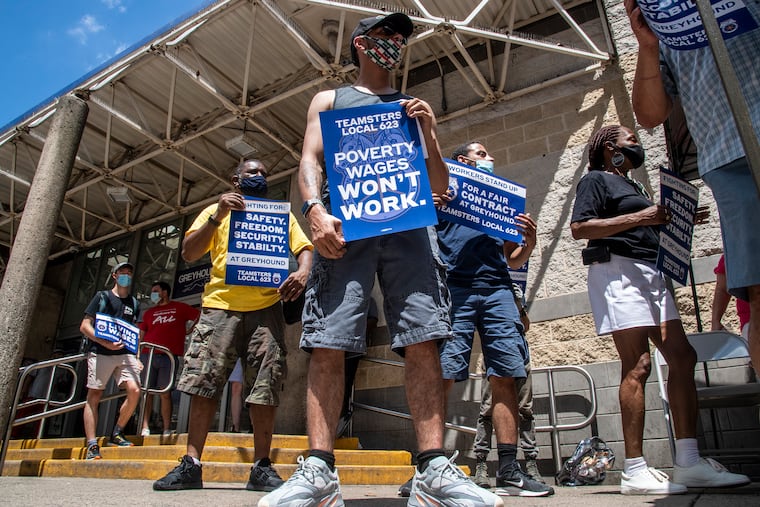Essential workers running Philly’s Greyhound station are fighting for stronger safety protections
While there’s hand sanitizer in the staff bathroom, there hasn’t been soap in the staff or public bathrooms for about two months, one worker said, despite pleas to management.

Over the last four years, Jerrod Martinez worked his way up from a cleaner to baggage handler to, finally, ticket agent at Greyhound’s bus terminal near Chinatown.
But a few months after he got the job he wanted, the pandemic hit, and Greyhound cut its staff.
Suddenly, the 24-year-old found himself working all three jobs on the overnight shift — including cleaning and disinfecting the entire station during a public health crisis.
Martinez, who makes just more than $13 an hour, says he barely has time to complete one job because he’s constantly being diverted to another. Although there’s hand sanitizer in the staff restroom, there hasn’t been soap in the staff or public restrooms for about two months, he said, although he and his coworkers have been asking management to order more. He disinfects surfaces such as the ticket kiosks when he can — about three times a week. A state order says that businesses must disinfect high-touch surfaces frequently.
“We really don’t have nobody,” he said. “Everybody is working by themselves.”
It’s why Martinez and his union, Teamsters Local 623, are fighting for health and safety language in their next contract, which has been under negotiation since June. The workers, who saw their ranks drop from about 30 to just below 10 because of coronavirus layoffs, have never had those kinds of protections in their contract, said Richard Hooker, the top official at Local 623. But it’s become top of mind for the workers who have been running the bus terminal throughout the pandemic.
“People all across the country come through here,” Hooker said. “We wanted to make sure our people are protected.”
The union wants contract language that will make health and safety a “grievable” right — meaning that if a worker does not feel safe, the union can file a grievance as a way to hold the company accountable. It’s an added layer of protection for workers who have seen how employers have flouted public health orders and worker safety laws as government agencies fail to enforce regulations. So far, Greyhound has not agreed to any health and safety language, Hooker said.
Greyhound spokesperson Crystal Booker said that the company could not comment on ongoing negotiations, but that it “respects the rights of all its team members to be heard.”
“Due to the significant impact COVID-19 has had on our industry, we recognize and understand there are changing needs for our team members and our business as a whole,” she said. “We hope to find an amicable solution that meets the needs of all parties involved.”
Many union contracts have language related to health and safety, and subsequently have better safety programs, said Peter Dooley, a certified industrial hygienist and senior health and safety project coordinator at the National Council for Occupational Safety and Health.
“During the pandemic, with workers experiencing life-and-death situations, the ability to bargain with employers about safety is more important than ever,” he added.
The workers held a picket outside the station Tuesday. The rail workers union, Teamsters-BMWED, brought Scabby the Rat for a spell.
Negotiations for the next three-year contract began in June, although the union was trying to get talks started in March, said Local 623′s director of operations Dino Guastella.
Other major sticking points include wages — Greyhound’s opening offer for starting salary for new hires was Pennsylvania’s minimum wage: $7.25 an hour, the union said — and being able to use vacation and sick days anytime during the year. Currently, there’s a 16-week blackout period around holidays.
The contract will expire in August.